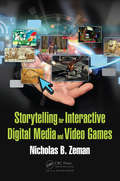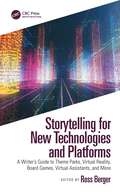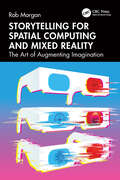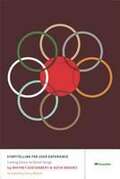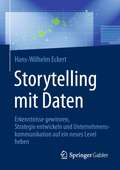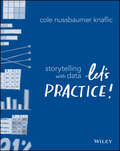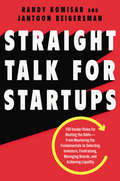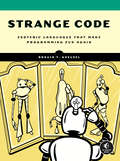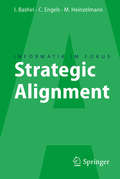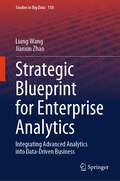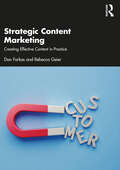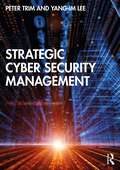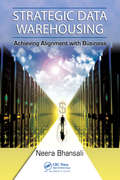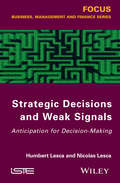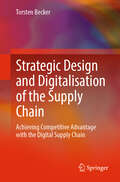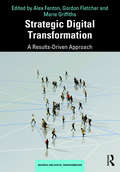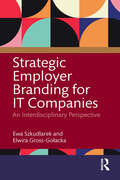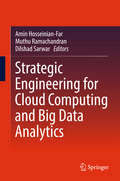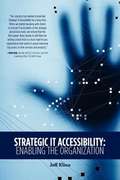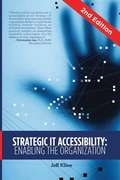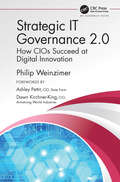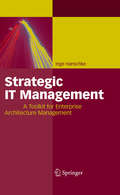- Table View
- List View
Storytelling for Interactive Digital Media and Video Games
by Nicholas ZemanThe evolution of story-telling is as old as the human race; from the beginning, when our ancestors first gathered around a campfire to share wondrous tales through oral traditions, to today, with information and stories being shared through waves and filling screens with words and images. Stories have always surrounded us, and united us in ways other disciplines can't. Storytelling for Interactive Digital Media and Video Games lays out the construct of the story, and how it can be manipulated by the storyteller through sound, video, lighting, graphics, and color. This book is the perfect guide to aspiring storytellers as it illustrates the different manner of how and why stories are told, and how to make them "interactive." Storytelling features heavy game development as a method of storytelling and delivery, and how to develop compelling plots, characters, settings, and actions inside a game. The concept of digital storytelling will be explored, and how this differs from previous incarnations of mediums for stories Key Features: Explores the necessary elements of a story (setting, character, events, sequence, and perspective) and how they affect the viewer of the story Discusses media and its role in storytelling, including images, art, sound, video, and animation Explores the effect of interactivity on the story, such as contest TV, web-based storytelling, kiosks, and games Shows the different types of story themes in gaming and how they are interwoven Describes how to make games engaging and rewarding intrinsically and extrinsically
Storytelling for New Technologies and Platforms: A Writer’s Guide to Theme Parks, Virtual Reality, Board Games, Virtual Assistants, and More
by Ross BergerWant to know what it’s like to write for a theme park attraction? Or an interactive toy? Or for a virtual reality game? Wait – those tell stories? And there are jobs for people to write them? Thanks to technology, interactive products and live experiences can now engage us with memorable characters and exciting adventures that were once only destined for the cinema. Storytelling for New Technologies and Platforms: A Writer’s Guide to Theme Parks, Virtual Reality, Board Games, Virtual Assistants, and More is a handbook for writers, students, producers, teachers, scholars, career changers, early tech adopters, and just about anyone who loves story and technology. As a collection of articles from some of the best creative writers in their medium, this book will prepare content creators of tomorrow to tackle some of today's most exhilarating creative challenges found on a screen ... or off! Key Features: Expert advice from several industry professionals who have worked for some of the world’s biggest tech and interactive companies. Best practices that not only guide writers on how to apply their craft to new fields, but also prepare them for the common ambiguity they will find in corporate and start-up environments. Breakdown of platforms that shows how tech capabilities can fulfill content expectations and how content can fulfill tech expectations. Basic storytelling mechanics customized to today’s popular technologies, live experiences, and traditional game platforms.
Storytelling for Spatial Computing and Mixed Reality: The Art of Augmenting Imagination
by Rob MorganThis is a clear, accessible manual of storytelling techniques and learning activities for spatial computing, augmented reality and mixed reality. It covers the key skills that the next generation of digital storytellers will need, providing readers with practical tools for creating digital stories and adventures out in the real world.Drawing on more than a decade of experience, veteran immersive storyteller Rob Morgan provides strategies and techniques for augmenting players and places with digital narrative. Readers will try out key ideas through a range of practical exercises, building up their own portfolio of augmented/spatial narrative projects.Storytelling for Spatial Computing and Mixed Reality provides insight on everything from narrative pacing to conditional and emergent storytelling for augmented/spatial technology. Each chapter addresses key questions about the affordances - and ethics - of augmenting players' realities, helping students and practitioners explore this new storytelling frontier.This book will be invaluable to students of game design, experience design and interactive narrative. It provides theories, best practices and case studies also relevant to creative professionals in games, XR, immersive theatre, theme parks and brand experience.
Storytelling for User Experience: Crafting Stories for Better Design
by Kevin Brooks Whitney QuesenberyWe all tell stories. It's one of the most natural ways to share information, as old as the human race. This book is not about a new technique, but how to use something we already know in a new way. Stories help us gather and communicate user research, put a human face on analytic data, communicate design ideas, encourage collaboration and innovation, and create a sense of shared history and purpose. This book looks across the full spectrum of user experience design to discover when and how to use stories to improve our products. Whether you are a researcher, designer, analyst or manager, you will find ideas and techniques you can put to use in your practice.
Storytelling in Design: Defining, Designing, and Selling Multidevice Products
by Anna DahlströmWith the wide variety of devices, touch points, and channels in use, your ability to control how people navigate your well-crafted experiences is fading. Yet it’s still important to understand where people are in their journey if you’re to deliver the right content and interactions atthe right time and on the right device.This practical guide shows you how storytelling can make a powerful difference in product design. Author Anna Dahlström details the many ways you can use storytelling in your projects and throughout your organization. By applying tried-and-tested principles from film and fiction to the context of design and business, you’ll learn to create great product experiences.Learn how the anatomy of a great story can make a difference in product designExplore how traditional storytelling principles, tools, and methods relate to key product design aspectsUnderstand how purposeful storytelling helps tell the right story and move people into actionUse storytelling principles to tell, sell, and present your work
Storytelling mit Daten: Erkenntnisse gewinnen, Strategie entwickeln und Unternehmenskommunikation auf ein neues Level heben
by Hans-Wilhelm EckertDieses Buch zeigt, welche Rolle Daten für Kommunikation und Marketing spielen und wie sie als wichtige Quelle für das Storytelling genutzt werden können. Denn Daten beflügeln als Rohstoff des digitalen Zeitalters die Unternehmensstrategie. Sie ermöglichen – sofern sauber gesammelt, interpretiert und aufbereitet – neue und mitunter überraschende Einblicke in Zusammenhänge und bieten die Chance, daraus spannende Geschichten zu entwickeln. Geschichten, die auch im Hinblick auf Unternehmensziele Relevanz schaffen, Dialoge entfachen und die Kommunikation wirksam machen. Der Autor erklärt auf leicht verständliche Art und Weise, wie sich datenbasierte Kommunikationsstrategien in packende Storys verwandeln lassen. Zudem liefert er nützliche Tools und zeigt auf, warum Daten lügen können, wie wichtig ihre optische Aufbereitung ist, wo ihr Einsatz an ethische Grenzen stößt und warum Datenschutz auch eine unternehmerische Chance ist. Anhand von praktischen Beispielen bietet das Buch Marketing- und Kommunikationsexperten – aber auch interessierten Managern aus anderen Disziplinen – zahlreiche Inspirationen und neue Perspektiven.
Storytelling with Data: Let's Practice!
by Cole Nussbaumer KnaflicInfluence action through data! This is not a book. It is a one-of-a-kind immersive learning experience through which you can become—or teach others to be—a powerful data storyteller. Let’s practice! helps you build confidence and credibility to create graphs and visualizations that make sense and weave them into action-inspiring stories. Expanding upon best seller storytelling with data’s foundational lessons, Let’s practice! delivers fresh content, a plethora of new examples, and over 100 hands-on exercises. Author and data storytelling maven Cole Nussbaumer Knaflic guides you along the path to hone core skills and become a well-practiced data communicator. Each chapter includes: ● Practice with Cole: exercises based on real-world examples first posed for you to consider and solve, followed by detailed step-by-step illustration and explanation ● Practice on your own: thought-provoking questions and even more exercises to be assigned or worked through individually, without prescribed solutions ● Practice at work: practical guidance and hands-on exercises for applying storytelling with data lessons on the job, including instruction on when and how to solicit useful feedback and refine for greater impact The lessons and exercises found within this comprehensive guide will empower you to master—or develop in others—data storytelling skills and transition your work from acceptable to exceptional. By investing in these skills for ourselves and our teams, we can all tell inspiring and influential data stories!
Straight Flush: The True Story of Six College Friends Who Dealt Their Way to a Billion-dollar Online Poker Empire and How It All Came Crashing Down...
by Ben MezrichFrom the New York Times bestselling author of The Accidental Billionaires and Bringing Down the House--the sources for the films The Social Network and 21--comes the larger-than-life true tale of a group of American college buddies who brilliantly built a billion-dollar online poker colossus based out of the hedonistic paradise of Costa Rica. One problem: the U. S. Department of Justice was gunning for them. . . . Based on extensive insider interviews and participation, acclaimed author Ben Mezrichs Straight Flush tells the captivating rags-to-riches tale of a group of University of Montana frat brothers who turned a weekly poker game in the basement of a local dive bar into AbsolutePoker. com, one of the largest online companies in the world, on par with some of the behemoths of the Internet. At its height, Absolute Poker was an online empire earning more than a million dollars a day, following savvy business strategy and even better luck. Its founders set up their operations in the exotic jungle paradise of Costa Rica, embracing an outrageous lifestyle of girls, parties, and money. Meanwhile, the gray area of U. S. and international law in which the company operated was becoming a lot more risky, and soon the U. S. Department of Justice had placed a bulls-eye on Absolute Poker. Should they fold--or double down and ride their hot hand? Impossible to put down, Straight Flush is an exclusive, never-before-seen look behind the headlines of one of the wildest business stories of the past decade.
Straight Talk for Startups: 100 Insider Rules for Beating the Odds--From Mastering the Fundamentals to Selecting Investors, Fundraising, Managing Boards, and Achieving Liquidity
by Randy Komisar Jantoon Reigersman"Straight Talk for Startups memorializes age-old best practices and empowers both experienced and new investment professionals to beat the odds."—David Krane, CEO, Google Ventures"Straight Talk for Startups is filled with real, raw, and fact-based ‘rules of the road’ that you need to know when diving into our ultra-competitive startup world. A must read and a re-read!"—Tony Fadell, Coinventor of the iPod/iPhone & Founder of Nest LabsVeteran venture capitalist Randy Komisar and finance executive Jantoon Reigersman share no-nonsense, counterintuitive guidelines to help anyone build a successful startup.Over the course of their careers, Randy Komisar and Jantoon Reigersman continue to see startups crash and burn because they forget the timeless lessons of entrepreneurship.But, as Komisar and Reigersman show, you can beat the odds if you quickly learn what insiders know about what it takes to build a healthy foundation for a thriving venture. In Straight Talk for Startups they walk budding entrepreneurs through 100 essential rules—from pitching your idea to selecting investors to managing your board to deciding how and when to achieve liquidity. Culled from their own decades of experience, as well as the experiences of their many successful colleagues and friends, the rules are organized under broad topics, from "Mastering the Fundamentals" and "Selecting the Right Investors," to "The Ideal Fundraise," "Building and Managing Effective Boards," and "Achieving Liquidity."Vital rules you’ll find in Straight Talk for Startups include:The best ideas originate from founders who are usersCreate two business plans: an execution plan and an aspirational planNet income is an option, but cash flow is a factDon’t accept money from strangersPersonal wealth doesn’t equal good investingSmall boards are better than big onesAdd independent board members for expertise and objectivityToo many unanimous board decisions are a sign of troubleChoose an acquirer, don’t wait to be chosenLearn the rules by heart so you know when to break themFilled with helpful real-life examples and specific, actionable advice, Straight Talk for Startups is the ideal handbook for anyone running, working for, or thinking about creating a startup, or just curious about what makes high-potential ventures tick.
Strange Code: Esoteric Languages That Make Programming Fun Again
by Ronald T. KneuselStrengthen your overall coding skills by exploring the wonderful, wild, and often weird world of esoteric languages (esolangs).Strange Code starts with a dive into the underlying history of programming, covering the early computer-science concepts, like Turing machines and Turing completeness, that led to the languages we use today. It then explores the realm of &“atypical&” programming languages, introducing you to the out-of-the-box thinking that comes from these unusual approaches to coding. Later chapters address the even more unusual esolangs, nearly all of which are like nothing you&’ve ever seen. Finally, author Ron Kneusel helps you develop and use two entirely new programming languages. You may not apply these languages in your day job, but this one-of-a-kind book will motivate you to think differently about what it means to express thought through code, while discovering the far-flung boundaries of programming. You&’ll learn:How to program with pictures using PietHow to write two-dimensional programs in BefungeHow to implement machine-learning algorithms using the text pattern matching language SNOBOLHow to decipher Brainfuck code like [->-[>+>>]>[[-]+>+>>]How to design and create two original programming languages Learning to think in these languages will make you a better, more confident programmer.
Strategic A2/AD in Cyberspace
by Russell Alison LawlorStrategic A2/AD in Cyberspace focuses on exclusion from cyberspace, or the ability of a state to be cut off entirely from cyberspace. Strategic anti-access and area denial (A2/AD) operations are common in other domains, but, before now, they have not been examined for their relevance to cyberspace. This book examines how strategic A2/AD operations can cut off states from cyberspace through attacks at either the physical or logic layers of cyberspace. The result of strategic cyber A2/AD operations could be catastrophic for modern economies, governments, military forces, and societies, yet there has been surprisingly little study of these threats to states' access to cyberspace. This book examines the implications of strategic cyber A2/AD operations for deterrence strategy and proposes a new view of how exclusion from cyberspace can be used as a coercive tool in diplomacy.
Strategic Alignment
by Marcus Heinzelmann Christoph Engels Iman BashiriVielen Unternehmen gelingt es nicht, ein anhaltendes Alignment in ihrer Organisation zu etablieren. Dabei kommt dem Strategic Alignment für die Schaffung von Wettbewerbsvorteilen und die Steigerung der Performance eine Schlüsselrolle zu. Beginnend mit einer Beschreibung des strategischen Alignments auf dem neuesten wissenschaftlichen Stand, entwickeln die Autoren ein ganzheitliches Vorgehensmodell, das auf erprobten Instrumenten und methodischen Ansätzen beruht. Der Band enthält drei Fallstudien zu Marriott International, Capital One und Volkswagen.
Strategic Blueprint for Enterprise Analytics: Integrating Advanced Analytics into Data-Driven Business (Studies in Big Data #150)
by Liang Wang Jianxin ZhaoThis book is a comprehensive guide for professionals, leaders, and academics seeking to unlock the power of data and analytics in the modern business landscape. It delves deeply into the strategic, architectural, and managerial aspects of implementing enterprise analytics (EA) systems in large enterprises. The book is meticulously structured into three parts. Part 1 lays the foundation for adaptable architecture in EA. Part 2 explores technical considerations: data, cloud platforms, and AI solutions. The final part focuses on strategy execution, investment, and risk management. Acting as a comprehensive guide, the book enables the creation of robust EA capabilities that foster growth, optimize operations, and keep pace with EA's dynamic world. Whether readers are leaders harnessing data's potential, practitioners navigating analytics, or academics exploring this evolving domain, this book provides insights and knowledge to guide readers toward a thriving, data-driven future.
Strategic Content Marketing: Creating Effective Content in Practice
by Dan Farkas Rebecca GeierStrategic Content Marketing offers a comprehensive guide to planning, creating, implementing and analyzing an effective content marketing strategy in practice. Each chapter marries established theory with modern practice, illustrating concepts with real-world case studies and examples alongside interviews with prominent content marketers, including a foreword by Joe Pulizzi, founder of The Content Marketing Institute and often referred to as the Father of Content Marketing. Chapter objectives and summaries structure learning, while reflective questions and activities aid comprehension. On reading, students will understand: The definition, purpose, and practical implementation of a content marketing programme The relationship between content marketing and broader marketing, strategic positioning, buyer personas, and research initiatives The most effective and valued forms of content marketing and how they are structured and used, including a special focus on digital and B2B content marketing How to create persuasive content and measure the effectiveness of content marketing The careers, associated competencies, and software technologies in the burgeoning field of content marketing. This comprehensive text is perfect core and recommended reading for advanced undergraduate and postgraduate students studying content marketing, inbound marketing, marketing communications, digital and social media marketing, and public relations. In practice, the book is also highly valuable for practicing professionals studying for professional qualifications and looking to develop their skills. Online resources include instructor teaching slides, four-color images and templates, and chapter test bank questions.
Strategic Cyber Security Management
by Peter Trim Yang-Im LeeThis textbook places cyber security management within an organizational and strategic framework, enabling students to develop their knowledge and skills for a future career. The reader will learn to: • evaluate different types of cyber risk • carry out a threat analysis and place cyber threats in order of severity • formulate appropriate cyber security management policy • establish an organization-specific intelligence framework and security culture • devise and implement a cyber security awareness programme • integrate cyber security within an organization’s operating system Learning objectives, chapter summaries and further reading in each chapter provide structure and routes to further in-depth research. Firm theoretical grounding is coupled with short problem-based case studies reflecting a range of organizations and perspectives, illustrating how the theory translates to practice, with each case study followed by a set of questions to encourage understanding and analysis. Non-technical and comprehensive, this textbook shows final year undergraduate students and postgraduate students of Cyber Security Management, as well as reflective practitioners, how to adopt a pro-active approach to the management of cyber security. Online resources include PowerPoint slides, an instructor’s manual and a test bank of questions.
Strategic Data Warehousing: Achieving Alignment with Business
by Neera BhansaliOrganization of data warehouses are vital but often ignored aspects of growing enterprises. This work merges technological know-how with managerial practices to show both the business manager and the IT professional how better alignment between data warehouse plans and business strategies can lead to a successful data warehouse adoption that will support the entire infrastructure. More complete than any other text in the field, this resource also addresses the managerial and strategic aspects of data warehouses, offering doable solutions that will allow for the strategic alignment of these warehouses while building them and ensuring that this alignment is sustained.
Strategic Decisions and Weak Signals: Anticipation for Decision-Making
by Nicolas Lesca Humbert LescaAn increasing number of business executives, managers and political leaders are using the concept of “weak signals” nowadays. There are also an increasing number of people trying to find out exactly what this concept means, as well as when and how to use it. Such questions arise particularly when it comes down to making strategic decisions. To help with these questions, this book defines the concept of the “weak signal” and then demonstrates how it would be useful in relation to strategic decisions, and more precisely in relation to three moments of the strategic decision, i.e.: - The trigger of the strategic decision (what is the trigger, why and when) - The development of the strategic decision - The implementation of the strategic decision
Strategic Design and Digitalisation of the Supply Chain: Achieving Competitive Advantage with the Digital Supply Chain
by Torsten BeckerDigital supply chains increase companies' competitiveness. A systematic approach describes the development of strategies to achieve challenging corporate goals with the supply chain and its digitalisation. These include better fulfilling customer requirements, increasing sales, and simultaneously reducing costs. Strategy patterns are presented, and their implementation in companies is described. Entrepreneurs, supply chain, and operations managers receive a practice-oriented guide on how to align their company for the future. The tried-and-tested methods and approaches accelerate and facilitate strategy development, implementation, and support through digital solutions. The focus is on making/buying decisions, finding solutions for skills, digital solutions in production technology (3D printing), and the impact of Industry 4.0 and environmental aspects on the supply chain. Practical examples will show how new solution concepts support the design of future-oriented supply chains. The trigger points that could jeopardise a successful supply chain will also be presented, as well as the design for time and cost optimisation in the overall chain. How must a company fundamentally question the historically grown supply chain? What is essential in supply chain optimisation? The strategies presented define the processes, architectures, the use of digital technologies and the deployment of resources - considering the overarching corporate strategy, which calls for shorter delivery times and lower costs to remain competitive.
Strategic Digital Transformation: A Results-Driven Approach (Business and Digital Transformation)
by Gordon Fletcher Marie Griffiths Alex FentonEmerging technologies are having a profound impact upon business as individuals and organisations increasingly embrace the benefits of the ‘always on’ attitude that digital technologies produce. The use of the web, apps, cloud storage, GPS and Internet-connected devices has transformed the way we live, learn, play and interact – yet how a business can fully benefit from this transformation is not always clear. In response, this book enables students and business leaders to take a strategic and sustainable approach to realising the value of digital technologies. It offers results-driven solutions that successfully transform organisations into data-driven, people-focused businesses capable of sustainably competing at a global level. Split across four key parts, the material moves through understanding digital business to planning, implementing and assessing digital transformation. The current challenges facing all small organisations, including limited resources, financial pressures and the lack of dedicated IT departments, are explored. The authors consider the ways in which innovation can increase competitive advantage, how innovative business models can create new opportunities and how a data-driven perspective can release embedded value within the organisation. Contemporary international case studies and examples throughout each chapter bridge theory with practical application and systematically document the patterns of activities that enable success. This textbook is a vital resource for postgraduate and undergraduate students of digital business, innovation and transformation. By showing how to initiate digital transformation across an organisation, it will prepare business owners, directors and management of small- and medium-sized businesses to take strategic advantage of new and emerging technologies to stay ahead of their competition.
Strategic Employer Branding for IT Companies: An Interdisciplinary Perspective
by Elwira Gross-Gołacka Ewa SzkudlarekWith the rise of a knowledge-based economy a change in the approach to the role of employees has come. This emphasised the pivotal role of human capital in business success, leading to a "war for talent," compelling organisations to enhance efforts to attract top talent. Employer branding has thus grown in significance. Initially rooted in human resources management, employer branding now incorporates interdisciplinary approaches combining brand, image, reputation and its impact on competitive advantage and strategic goals. Employers are increasingly viewing employer branding as crucial for attracting talent.Marked by a talent shortage, the IT industry is emblematic of employer branding’s importance as it faces unique challenges, which include the lengthy and costly process of training IT professionals and the globalised labour market driven by remote work. The COVID-19 pandemic further reshaped labour market dynamics, intensifying the need for effective employer branding.Strategic Employer Branding for IT Companies: An Interdisciplinary Perspective focuses on both theoretical analyses and practical tools for effective employer branding. The book proposes an interdisciplinary approach in a strategic context, addressing employer branding’s role in competitive advantage. The book: Reviews definitions and models of employer branding Identifies interdisciplinary areas supporting employer branding strategies Presents a model for a strategic approach to employer branding Analyses in global terms the IT sector in Poland as a case Provides practices, recommendations and tools for employer branding The book’s highlight is a proprietary employer branding model for the IT industry. Bridging theory and practice, this model offers valuable insights for international stakeholders,enriching academic literature and supporting strategic employer branding implementation. This book is a contemporary guide for researchers, practitioners and students on how to develop robust employer branding strategies.
Strategic Engineering for Cloud Computing and Big Data Analytics
by Amin Hosseinian-Far Muthu Ramachandran Dilshad SarwarThis book demonstrates the use of a wide range of strategic engineering concepts, theories and applied case studies to improve the safety, security and sustainability of complex and large-scale engineering and computer systems. It first details the concepts of system design, life cycle, impact assessment and security to show how these ideas can be brought to bear on the modeling, analysis and design of information systems with a focused view on cloud-computing systems and big data analytics. This informative book is a valuable resource for graduate students, researchers and industry-based practitioners working in engineering, information and business systems as well as strategy.
Strategic IT Accessibility: Enabling The Organization
by Jeff KlineA strategic guide to understanding, enabling, and implementing IT accessibility across organizations of any size, type, or geographic location. IT accessibility, or lack thereof, can have a profoundly positive or negative effect on an organization in the private or public sector. Only when IT accessibility is considered organization-wide can one gain perspective on the magnitude of its potential advantages and impacts. Considering IT accessibility in all its dimensions requires a comprehensive, holistic approach one that integrates IT accessibility into the fabric of an organization s business, operations, and culture. This book, the first of its kind, deals with the business end of IT accessibility how to enable the organization rather than perform technical enablement at a coding level. Unlike the typical piecemeal approach used by most organizations today, this book provides those in both the private and public sector with an understanding of all the moving parts needed to enable and maintain IT accessibility over the long term.
Strategic IT Accessibility: Enabling the Organization
by Jeff KlineThis strategic guide to understanding, enabling, and implementing information technology accessibility across organizations of any size, type, or geographic location, is an essential resource for technology professionals and executives. IT accessibility, or the lack thereof, can have a profoundly positive or negative effect on an organization in the private or public sector. Only when IT accessibility is considered organization-wide can one gain an appreciation for its potential advantages. Drawing on his decades of experience in IT accessibility leadership at IBM and in state government, Jeff Kline clearly articulates how to build and maintain holistic organization-wide IT accessibility programs that integrates IT accessibility into the fabric of your organization’s business, operations, and culture; make your organization’s IT offerings and internal IT environments accessible and inclusive to all audiences.
Strategic IT Governance 2.0: How CIOs Succeed at Digital Innovation
by Philip WeinzimerWeinzimer provides industry case studies of companies that have implemented multiple components of The Strategic IT Governance 2.0 model. These companies successfully leveraged collaboration between technology and the business to deliver technology projects that provide the best customer value, improve cost efficiencies, and create a governance culture across business areas. In his book, you will learn valuable lessons to implement an innovative governance model for your company.— Ashley Pettit, CIO, and Senior Vice President, Enterprise Technology, State Farm In Strategic IT Governance 2.0, Phil provides a number of exciting case studies of how CIOs are leveraging technology to innovate and create value. They are following Phil's model, building strategic and tactical relationships within the business to drive technology growth strategies, collaborating with partners to improve customer service and increase value with process optimization and best practice metrics. Each of these companies offers a slightly different take on the multiple components of the Strategic IT Governance 2.0 model; however, these organizations' collective and individual success indicates the strength of the components.— Dawn Kirchner-King, Vice President and Chief Information Officer, Armstrong World Industries Today's business environment is more complicated, creating additional challenges for the successful execution of strategic enterprise projects. Unless an organization revisits its governance model, strategic projects are at risk of negatively impacting business success. So, how do companies succeed in overcoming these obstacles to improve project success? Strategic IT Governance 2.0: How CIOs Succeed at Digital Innovation explains how IT executives can take the lead and successfully drive digital transformation initiatives and associated projects. The book presents the Strategic IT Governance 2.0 model that focuses on project alignment, process reinvention, and leadership excellence. It is filled with case studies of the model’s implementation, giving practical insight into how organizations have successfully executed digital transformation.
Strategic IT Management
by Inge HanschkeFor you as an IT manager, changes in business models and fast-paced innovation and product lifecycles pose a big challenge: you are required to anticipate the impact of future changes, and to make rapid decisions backed up by solid facts. To be successful you need an overall perspective of how business and IT interact. What you need is a toolkit, enabling you to manage the enterprise from a helicopter viewpoint while at the same time accommodating quite detailed aspects of processes, organization, and software lifecycles. Strategic IT management embraces all the processes required to analyze and document an enterprise's IT landscape. Based on the experience of many projects and long discussions with both customers and academic researchers, Inge Hanschke provides you with a comprehensive and practical toolkit for the strategic management of your IT landscape. She takes a holistic view on the management process and gives guidelines on how to establish, roll out, and maintain an enterprise IT landscape effectively. She shows you how to do it right first time - because often enough there's no second chance. She tells you how to tidy up a IT patchworks - the first step towards strategic management - and she gives you advice on how to implement changes and maintain the landscape over time. The book's structure reflects the patterns that exist in strategic IT management from strategic planning to actual implementation. The presentation uses many checklists, guidelines, and illustrations, which will help you to immediately apply the content. So, if you are a CIO, an IT manager, a business manager, or an IT consultant, this is the book from which you'll benefit in most daily work situations.
